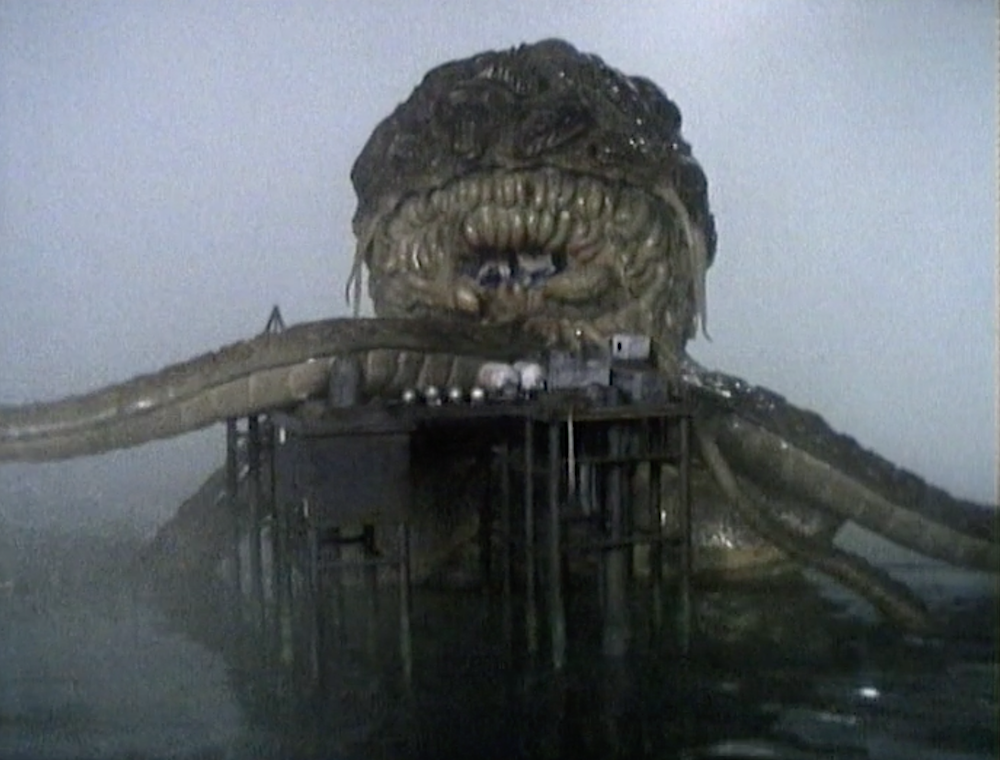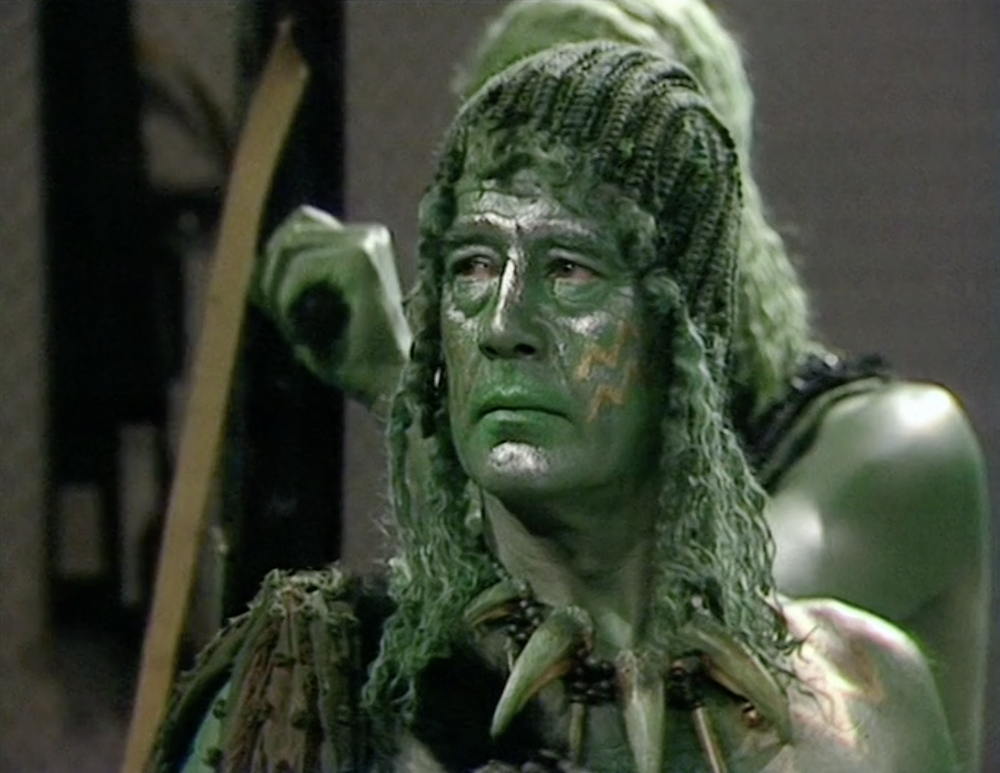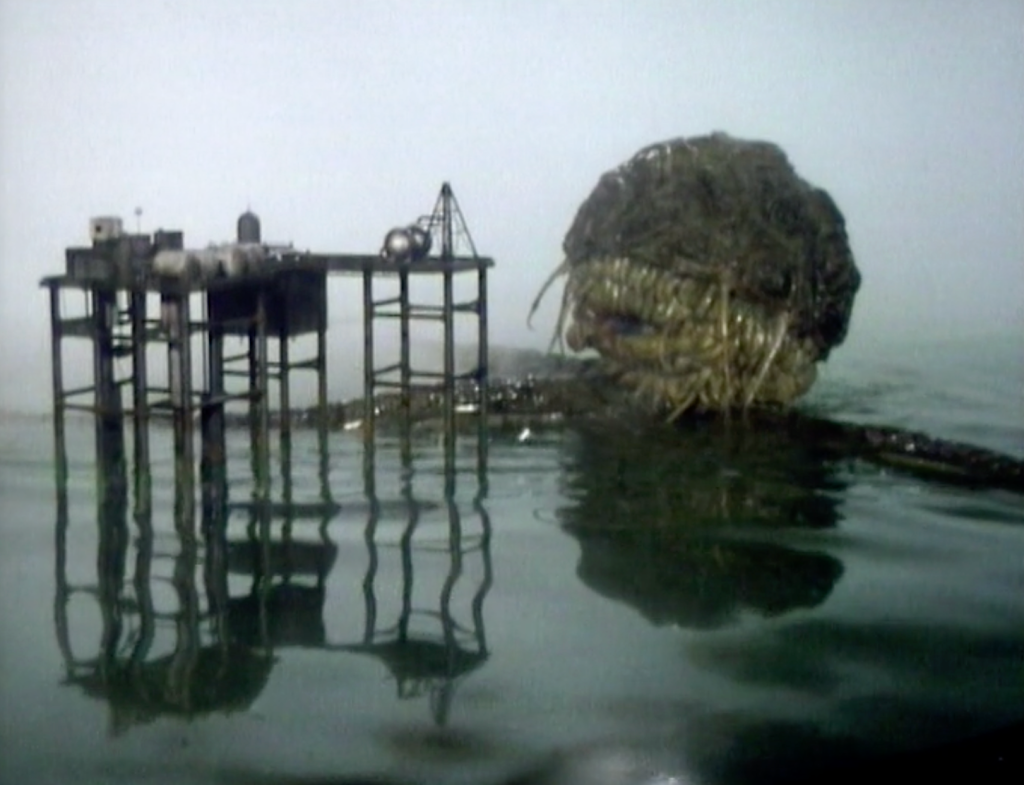
It was a world of water.Lagoons the size of seas covered most of its surface, so that the swampy, low-lying land masses were in constant danger of flooding. Water streamed from perpetually overcast grey skies, in rain showers which ranged from the mildest drizzles to torrential downpours. Even when it wasn’t raining, water seemed to hang in the air in an ever-present haze. It was no place for men—but men lived there all the same.
‘Progress is a very flexible word. It can mean just about anything you want it to mean.‘
‘Well, I’ve just done a routine scan of the bottom.‘
Kroll! Kroll! Kroll! Kroll! Kroll! Kroll! Kroll! Kroll! Kroll! Kroll!
Ah ‘The Power of Kroll’ – a mixture of the ludicrous and the rather marvellous (at least for me). Where we realise that the cynicism of Robert Holmes, like many of us, is borne out of his idealism. Where our sympathies lie with the dispossessed, exploited and pushed about, when you realise that at heart he wasn’t that much different to Mac Hulke – both ultimately disliked authority and being told what to think – and my reading is that those that try to portray them as opposites are fundamentally wrong. Read the two Target novelisations of ‘Dinosaur Invasion’ and Dicks’ version of ‘Kroll’ and the references to ‘Red Indians’ are striking –
‘We shall found a settlement. We have seed, tools, and enough provisions to keep us going for a year. We’ll be like the Pilgrim Fathers who went to America.’
‘What about the present inhabitants of the planet? I don’t think the Red Indians liked the Pilgrim Fathers very much. Maybe these people won’t like us.’ ‘We shall treat them kindly and decently,’ Mark insisted. ‘We’ll guide them, and make sure they don’t make the same mistakes that were made on Earth.’
‘Originally, the Swampies had been the native inhabitants of Delta Magna itself. When swarms of colonising Earthmen had over-run their planet, the Swampies had been shipped off to one of its satellites. Delta Three was a desolate watery planetoid, then thought to be useless. The Swampies had been de-ported there, much as the Red Indians of Earth had been sent off to reservations in America. They had been promised that the little world should be theirs, and theirs alone. But the scientists on Delta Magna had found a use for Delta Three after all, and the Refinery had been set up. If it was successful, there would be more refineries and still more, until Delta Three was as industrialised as Delta Magna itself, and the Swampies would be homeless once again.’
I am guessing that this reflects the change in a generation who grew up with the version of the American West peddled by Westerns, changing to a more sympathetic view in the 1970s with the publication of books such as ‘Bury My Heart at Wounded Knee’ and films like ‘Little Big Man’. The treatment of Mensch also reflects British colonialism and the use of ‘natives’ as servants. The message of these might seem clumsy now – especially when the ‘natives’ are painted green (!), but do represent a pretty big about turn in the awareness of what had been done in the name of progress over last 200 years. I grew up with these messages, my father grew up with the westerns – cowboys good – Indians bad, that is progress of sorts.
Robert Holmes and the shopping list of doom..
Anyway, it is sad to think that ‘The Power of Kroll’ could have been the last story from the pen of Robert Holmes. If Eric Saward hadn’t been so persistent in convincing JNT to bring him back, persisting even after Bob pulled out of ‘The Six Doctors’ it would have been his epitaph on the show. On one hand I’m glad it wasn’t – we got ‘Caves of Androzani’ and I wouldn’t want to lose that, on the other hand ‘Mysterious Planet’ and the events surrounding it are a less fitting end – sadly both to Bob’s time on the show and his life. But something has always puzzled me about Robert Holmes and his relationship with the show – why people seemed to be obsessed with telling him what to write? To my mind, nobody writes ‘Doctor Who’, at least in the classic era, better than Robert Holmes, so each time this happens he is effectively being told what to write by lesser talents. Unless all of this is a back-handed compliment and they assume he can write anything so why not give him a shopping list, it doesn’t make much sense. He was the best writer the show had, all of the evidence points to him doing his best work when left to his own devices. It can’t be that difficult to grasp surely?
Bob, we need Five Doctors – or it might be 4, and loads of companions, but we don’t know which ones and we’ll keep changing them until the day we start shooting – and the Master, oh and Cybermen for Eric. Bob? Anyone got Uncle Terrence’s number?
Bob, we need a story set in New Orleans, two Doctors, the Sontarans, oh better make it Seville instead for no apparent reason.
Bob, can you write one that includes the Master, the Rani, the Autons and oh set it in Singapore? Oh, on second thoughts don’t bother we’ve been cancelled.
Bob, we need an opener for this great idea I have for a trial, you’ve got to make it funny, Grade really wants it to be funny – got that? Sorry Bob, can you make it less funny, Powell doesn’t want it to be funny. Bob, Bob are you still there?
Graham Williams and his big idea (part two)
Not content with his big idea about the guardians and the quest for the key to time. Graham has had another! This story starts it’s life like this:
GRAHAM/TONY: Bob, can you write us a story with the biggest monster in ‘Doctor Who’ history?
BOB: For ¤¤¤¤s sake, are you really sure Graham, that sounds like a very bad idea to me? Are you sure you can make this?
GRAHAM/TONY: Sure Bob, my crack design team, fresh from ‘Play School’ have told me it will be great, they’ll even throw in a countdown clock, roughly hacksawed out of some stock sci-fi flattage. Oh and some wobbly sets just so we can confirm that old bloody cliché that people will keep rolling out endlessly in 1990’s cheap ‘I love 1978’ type shows.
BOB: Oh all right, I’ll do it if I have to, but can I make it fart a lot? Don’t worry I’ll cover it up in some scientific terms about methane.
Every producer seems to have this moment of madness and none of them quite seem to look at the past and learn this lesson – Verity and Vortis, Barry Letts and the dinosaurs, Philip Hinchliffe and the rat/loch ness monster, JNT with the Myrka and lots of other examples. It is all rather endearing really, Graham seems afflicted with this more than most – the big idea, with no budget and never really learning – it is as if the production team were memory wiped every year. One ting he isn’t lacking in is ambition and you have to admire that.
Despite all of that…

Anyway, despite all of that and someone on the production team deciding to paint the Swampies green (they aren’t in the script) and making the extras and a very put-upon John Abineri wear very short skirts, I actually quite like the ‘Power of Kroll’. I mean I wouldn’t want to watch it with anyone who doesn’t love this stuff, but to my mind at least there is actually a very capable script in the middle of all of this, despite it being Bob’s least favourite. On top of that the cast is really top notch – the aforementioned John Abineri, the always excellent Philip Madoc (who does look a bit miserable – almost as if he really wanted to be playing Thawn…) and Neil MacCarthy. The wetland setting is also pretty different for the show – it looks terrific. And then there is that nostalgia factor, which I can’t separate out when formulating my opinion of all of this.
Bob Holmes does effortlessly build a world again here, including an array of convincing neologisms (Baygule for example) and technical terms to describe it – as ever with his writing the detail just convinces you. In some ways, the script is actually fairly similar to ‘Caves of Androzani’ – corporate greed and exploitation of the by-product from a species (bat/squid) and hardened gun runners working for the other side than first appearances suggest. It doesn’t have a character as fascinating as Sharez Jek, but it does have the added dimension of the parallel to the treatment of first nations peoples in the Americas. The crew of the refinery reflect each view – hatred of the Swampies (Thawn), indifference (Fenner) and indignation at their treatment (Dugeen – representing the views of the ‘Sons of Earth’ pressure group – including environmentalism and the treatment of the Swampies). The character of Mensch allows us to see how they are treated first hand:
DOCTOR: And just the six of you here?
THAWN: No, five.
DOCTOR: Oh no, I make it six. One, two, three
THAWN: Oh, you’re counting Mensch. He’s a Swampie.
DOCTOR: Doesn’t he count?
THAWN: No.
DOCTOR: Ah . Why are his friends attacking you?
THAWN: Because they’re ignorant savages.
DUGEEN: They were the first on Delta Magna.
FENNER: I don’t think we owe them very much for that.
DUGEEN: We took their planet. Now they’re afraid we’ll take what they’ve got left.
FENNER: You know there are times, Dugeen, that I think the Sons of Earth have got at you.
HARG: Two minutes to shot.
DUGEEN: When we put ten full scale refineries in here, there’ll be no room for the natives and they know it.
Just what kind of squid is Kroll anyway?
And well onto Kroll. For a start, he doesn’t look or behave much like any squid species I know – and I’ve spent a long-time contemplating squid. I have entire books on squid here in my library of natural history books (library might be a bit grand – it’s a set of shelves in the entrance to the cottage and an armchair for reading them whilst having a snifter!). Anyway, cephalopods fascinate me, partly because they are intelligent in an almost alien way and some species bio-luminesce in quite beautiful ways – I remember Richard Dawkins talking in ‘Un-weaving the Rainbow’ about how similar the cells are to pixels and potentially being able to play moving pictures on their skin with correct stimuli. They are also prey for quite my favourite animal species – Sperm Whales and the species of Beaked Whales. Both are deep diving species – they travel kilometres down into deep sea canyons and slopes of sea mounts hunting squid.
I’ve also spent a fair bit of time down in the Sea of Cortez and have a number of times encountered the frankly terrifying Humboldt Squid. In one encounter with them, a large group were at the surface in daylight, savagely hooked orange tentacles flailing in a huge pulsating mass. One of the oddest natural spectacles I have ever seen – quite alien looking. The theory is that they are moving range north with warming and to occupy the ecological niche being left vacant by the mass removal of shark species in the Pacific for the Chinese shark-fin market. They sometimes attack en-masse and in a frenzy, divers who work with them have to wear chainmail. So, squid can be really scary. Just that Kroll doesn’t look much like a squid (the body plan and mantle are completely different) or act much like one either – he is an alien, mutant squid I suppose – he actually he looks like a giant green celeriac with tentacles. But he must be massively mutated, as after his conversion back to the segment, what is left over are lots of much smaller squid, that look like Earth species and are no longer ‘Sci-fi monster green’ (I’d love that to be on a colour swatch of paint from B&Q). Knowing the luck of the swampies – someone on Delta Magna is probably planning a calamari fishery…

What Kroll does do, is to tap into a mythological and literary tradition of giant squid or octopi menacing mariners from the legend of the Kraken, through Jules Verne to the Ray Harryhausen variety that used to pop up to attack the likes of Doug MacClure in the films of my youth. Kroll, well I do actually find him rather scary, the model itself is actually pretty good (is that just me?), OK I know the CSO is rubbish and that horizon line is horrible and the wobbly methane refinery model is equally terrible, but the idea of something so big that can just plough through a settlement and pull people down into the swamp is pretty terrifying. I might be alone in that though…
Kroll as a god
Kroll also represents an interesting take on religion. Normally in ‘Doctor Who’ a religion on an alien planet is based on myth or a misinterpretation of scientific or historical fact. Here the religion is actually correct in pretty much all respects – Kroll is a god within the world of Delta Three and to the Swampies. He is as massive and powerful as the legend (half a mile across in the script), he did swallow a symbol of power and the high priest and is quite capable of wiping out the Swampies and their enemies. Within the world of Delta Three, he is to all intents and purposes god-like. And the Swampies written and oral history is correct – even with the feint of the false version of Kroll at Romana’s sacrifice – their god has just slept for a while. The voice of free-thinking pragmatism and cynicism (representing Bob himself?) against the local religion – Varlik, who loses his faith across the story is right in respect that Kroll doesn’t protect or care about the Swampies, Ranquin is wrong in that respect – but that doesn’t change the fact that the basis of their religion is in fact correct.
So, there is more going in here than just a big, methane producing monster and some ‘natives’ painted green. I might be stretching it a bit, but with a slightly more competent production, this one would probably be my favourite of the season. Where is Dougie Camfield when you need him?
Ps. Whilst reviewing this I also read Terrence Dick’s novelisation, Admittedly, it didn’t take long, but it was a bit of a revelation, I mean it isn’t great literature, but I had always had his end of Tom-era books as very short and churned out as quickly as possible with the minimum description and additions to the script. I actually rather enjoyed some of his descriptions and the way he quickly drew the world and it’s characters, maybe he made more of an effort for Bob Holmes, I haven’t read any of the others since the early 80’s, so who knows.